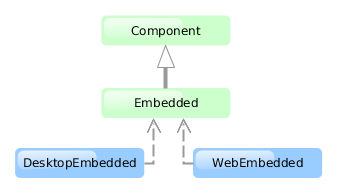4.5.2.1.8. Embedded
Embedded component is intended for displaying images and embedding arbitrary web pages into the application screens.
XML name of the component: embedded

The component is implemented for Web Client and Desktop Client. Desktop Client supports image display only.
Below is an example of using the component to display an image from a file located in FileStorage.
-
Declare the component in an XML screen descriptor:
<groupBox caption="Embedded" spacing="true" height="250px" width="250px" expand="embedded"> <embedded id="embedded" width="100%" align="MIDDLE_CENTER"/> </groupBox> -
In a screen controller, inject the component itself and the
FileStorageServiceinterface. Ininit()method, get theFileDescriptorpassed from the calling code, load the corresponding file in a byte array, create aByteArrayInputStreamfor it, and pass the stream to thesetSource()method of the component:@Inject private Embedded embedded; @Inject private FileStorageService fileStorageService; @Override public void init(Map<String, Object> params) { FileDescriptor imageFile = (FileDescriptor) params.get("imageFile"); byte[] bytes = null; if (imageFile != null) { try { bytes = fileStorageService.loadFile(imageFile); } catch (FileStorageException e) { showNotification("Unable to load image file", NotificationType.HUMANIZED); } } if (bytes != null) { embedded.setSource(imageFile.getName(), new ByteArrayInputStream(bytes)); embedded.setType(Embedded.Type.IMAGE); } else { embedded.setVisible(false); } }
In Web Client, the component enables displaying of files located inside VAADIN folder. For example:
embedded.setRelativeSource("VAADIN/themes/halo/my-logo.png")You can also define a resource files directory in the cuba.web.resourcesRoot application property and specify the name of a file inside this directory:
embedded.setSource("my-logo.png")In order to display an external web page, pass its URL to the component:
try {
embedded.setSource(new URL("http://www.cuba-platform.com"));
} catch (MalformedURLException e) {
throw new RuntimeException(e);
}